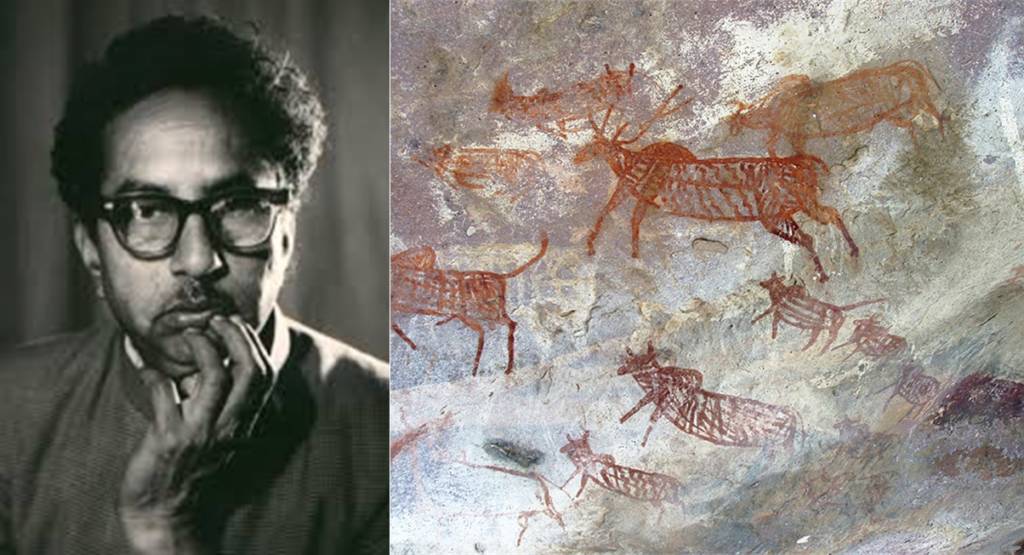Sanskar Bharti, the cultural wing of RSS, has decided to honour with 100 heritage walks, Vishnu Shridhar Wakankar, the man who discovered Bhimbetka caves and traced the Saraswati River basin. Lalit Kala Akademi and other government run cultural institutions have scheduled year-long programmes in his honour.
Wakankar, one of the greatest archaeologists of India, was born in Madhya Pradesh, made most of his discoveries while travelling by cycle or walking down the path, without much help from modern equipments of archaeology.
Bhimbetka caves, discovered by Wakankar, are the earliest evidence of human settlement on Indian subcontinent. UNESCO declared Bhimbetaka caves as World Heritage Site in 1970. “The Bhimbetka caves discovered by Wakankar are important to know how human civilisation developed,” Amirchand, national general secretary of Sanskar Bharati, said and added that, “Our Puranas have different stories of avatars. Similarly, the Bhimbetka paintings have boars, elephants, deer, cattle and snake. In a way, the discovery validates our stories and ways of worship.”
Wakankar also took upon the herculean task of discovering the route of Saraswati River, which finds mention Puranas. Saraswati River was an important source of freshwater during Puranic times. The British and Marxist historians of the country denied the past existence of the Saraswati River and called the Puranas a myth.
However, the people who have read original texts have maintained that the Puranas are rich with elements of the history of Hinduism. The historians, aware of rich traditions of oral history of Hinduism, also believe that Puranas and Itihasa (Ramayan and Mahabharata) is the source of history of Hinduism. To vindicate the historical importance of Puranas, it was very important to establish the past existence of the dried-up Saraswati River.
In 1983, Wakankar collaborated with RSS veteran Moropant Pingale and launched Saraswati search Abhiyan. In their travels across northwestern Indian states (Himachal Pradesh, Haryana, Rajasthan and Gujarat), the 18 members team find that Saraswati was Nadimata- the mother of rivers.
The Saraswati’s flow was through northwestern India and it was bigger than any river of modern-day India. The Indus valley civilization was dependent on Saraswati and as the river dried, the civilization is said to have shifted to Ganges.
Wakankar argued the change the name of Indus valley civilization to ‘Sara-swat civilisation’. In 2003, NDA I launched Saraswati Heritage Project to support further research and maintenance of historical sites of Saraswati civilization. But, the Congress-led UPA government, which was dependent on Communist parties to maintain majority in parliament, scrapped the project.
This shows the hatred of Marxist historians towards Hindu culture. The Marxist historians continue to live in denial despite historical evidences of Saraswati River. Modi government revived the Saraswati Heritage project and Haryana Saraswati Heritage Development Board (HSHDB) was formed in 2015.
Archaeologist GB Deglurkar, former president of Deccan College, said that Wakankar’s discovery of Saraswati civilization is more important than his findings of Bhimbetka caves. According to Deglurkar, the search for Saraswati is, “search for the roots of its civilisation”. “There are nearly 1,400 sites mentioned in our Puranas along with the river Saraswati and it has always been a part of our prayers to rivers, uttered in the same line as Ganga and Yamuna. If it were not for Wakankar’s efforts, there would have been no attempts to trace the river,” he said.
Lalit Kala Akademi will organize different programs and lectures on Wakankar’s work. But the people who were at the helm of Akademi during Congress regime has a problem with this. “While Wakankar’s work in the field of archaeology and rock art was important, he did not have much of a name in contemporary art,” said Ashok Vajpeyi, a Congress leader who supported Emergency, and got the post of chairman of Lalit Kala Akademi during UPA era.
The Marxist and Nehruvian Historians had denied credit to Wakankar’s work due to his association with RSS. He was founder general secretary of Sanskar Bharti, the cultural wing of the umbrella body. However, reputed historian Nayanjot Lahiri said, “he was an inveterate archaeologist who discovered sites while travelling in trains and on the road. In 1974, he spotted a prehistoric site at Agar while riding a bicycle to Narwar. It turned out to be one of the richest deposits of tools made on pebbles in Malwa.”
The Marxist historians have maintained that Saraswati civilization was established by Aryans who were inhabitants of Central Asia and came to India as invaders. But, in a big blow to the historians still reeling from a colonial hangover, a DNA study on skeletons found in Rakhigarhi has found no traces of the Aryan gene, wrecking the basis of the Aryan Invasion Theory. Rakhigarhi is a village in Hisar District in the state of Haryana in India is the site of a pre-Indus Valley Civilization settlement going back to millennia. The study — titled ‘An ancient Harappan genome lacks ancestry from Steppe pastoralists or Iranian farmers’, led by archaeologist Vasant Shinde examined remain of Indus Valley Civilisation but found no trace of R1a1, or the ‘Aryan gene’.
The Man who discovered the evidence of oldest human settlement of Indian civilization, helped to locate Saraswati civilization, which vindicated the fact that Hinduism is oldest surviving civilization in the world should be honoured with highest ranking award of Indian government. Vishnu Shridhar Wakankar deserves recognition not only from Sanskar Bharti or Lalit Kala Akademi, but Modi government should also honour his contribution through a Bharat Ratna.
